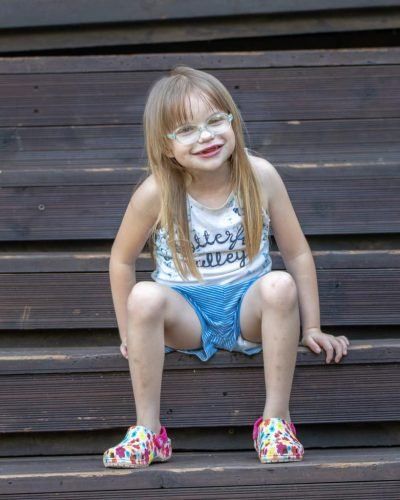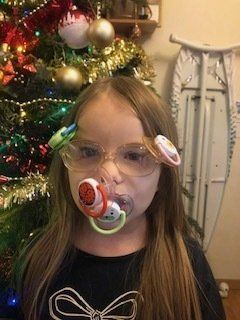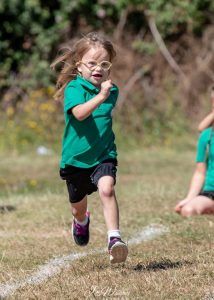Reflection of OCNDS parent on Rare Disease Day 2021

By: Claire Whitehill
Kirsty was born 7 weeks early due to Strep B and spent the first 3 weeks in the Special Care Baby Unit with an NG tube. She went back into hospital a couple of weeks after she came home because she had Bronchiolitis and was holding her breath and going blue. She was in the high dependency unit on C-PAP. When she failed to thrive, we thought it was just because of her bumpy start and were assured by family and health care workers that she would catch up. She did not gain weight from breastfeeding and had to have supplementary bottle feeds. She did not sit, crawl or interact at the ages our other 3 children hit these milestones, so we kept asking the Health Visitor and were referred to a Paediatrician who gave Kirsty the Global Development Delay label.
Not having a diagnosis made every claim for assistance a struggle. Kirsty has an Education and Health Care Plan, which we were rejected for on first application and had to appeal. Kirsty receives Disability Living Allowance and we have recently acquired a blue badge for free parking.

She was sitting at 1 year, walking at 2 and began to speak at around 3. She had appointments with so many different specialists. The Physio taught her how to push herself up from lying to sitting. The OT gave us exercises for the Hypermobility and gross and fine motor skills development. The Dietician prescribed high calorie milk. The Ophthalmologist said she had Astigmatism and prescribed glasses. The hearing tests were always failed due to congestion in her ears.
I spent hours googling her symptoms and diagnosed her myself many times incorrectly, I thought we would never get an answer and I would always wonder if I had done something wrong to cause the delays. All of the baseline and microarray genetic tests came back clear, so we were referred to the Geneticist at Oxford who signed us up for the 100,000 Genomes Project. Our blood was taken in 2016 and three years later we received the results, a diagnosis of Okur-Chung Neuroevelopmental Syndrome which is caused by a change to the CSNK2A1 gene.
OCNDS
Kirsty was one of only 60 children to have been diagnosed although now that number has doubled, and it is predicted that there could be many thousands of other undiagnosed patients across the world. As OCNDS is an ultra-rare condition, there was very little literature or information available about it. Luckily, a Foundation had been established by one of the parents in the US, so we finally had a community to be part of and felt like we belonged.
Kirsty’s main symptoms are short stature and low weight, speech delay, learning disabilities, Microcephaly and Autism. She also has problems with toileting and sleeping. She is 9 but is in 6 year-old clothes and learning at the level of year 1. She still uses dummies to comfort herself and can balance 4 on her face at once! People living with OCNDS have a varying range of symptoms and there is a wide spectrum of severity. Lots of the other people living with OCNDS have epilepsy and are non-verbal. As far as we know OCNDS does not limit life expectancy and there are adults living with OCNDS, some of whom have jobs and live independently. There is a 50% chance of passing the gene on if people with OCNDS have children of their own. The positive traits of OCNDS are that the children are happy, loving, determined, resilient and popular. Kirsty loves swings, trampolines, cuddles, babies, Barbies, Lego, Playmobile and Netflix!

We wanted to be as involved as possible with the CSNK2A1 Foundation, so I applied to be on the Parent Advisory Board. We have just finalised out first project for a needs assessment survey and will be launching this in February. Other projects we are working on are a brochure for families and health care workers / teachers about OCNDS and a campaign to encourage people to sign up to Simons Searchlight, the natural history research programme for OCNDS and other syndromes linked to Autism and developmental delay. Drs Okur and Chung from Columbia University who discovered the genetic change in 2016 are very much involved with the work of the Foundation: sitting on the Scientific Advisory Board, and joining family zoom calls and conferences.
The Future
Kirsty is currently attending a mainstream primary school and whilst she is progressing at her own pace, learning to read, write and add numbers, the gap with her peers is widening and we feel it may be time for Kirsty to move into a school which can offer her a more specialised provision. We expect that Kirsty will probably live at home with us forever and be an adult with learning disabilities. The future is a mystery, but as long as she is happy and healthy that is good enough.

